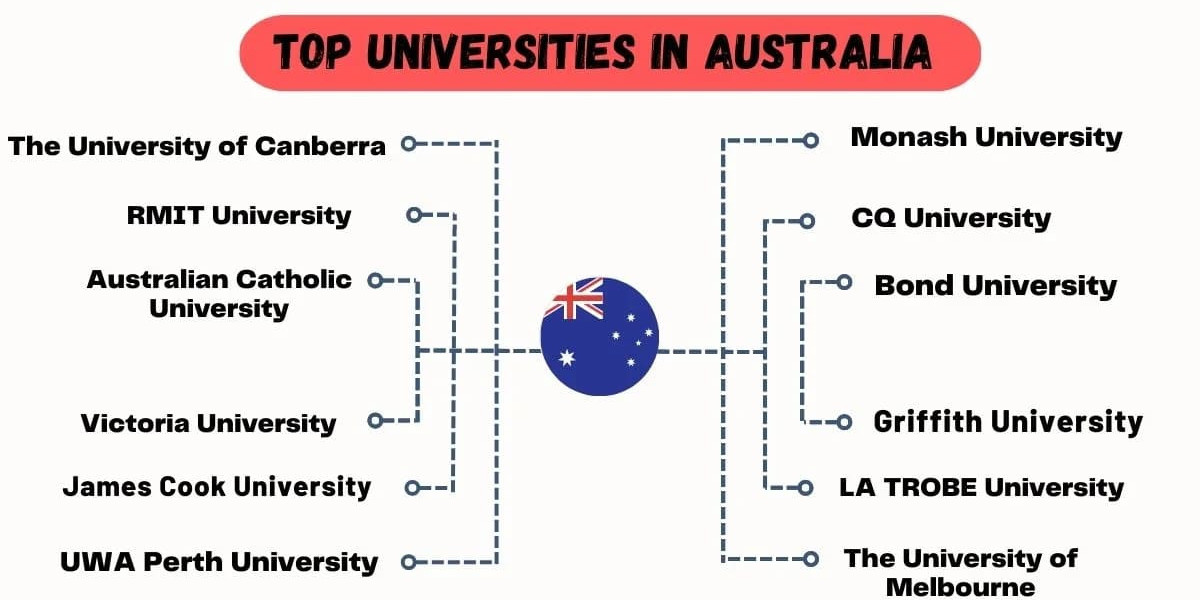Australia hosts some of the globe’s leading universities, making it a prime destination for international students. Renowned for its robust academic tradition, cultural diversity, and excellent quality of life, the country offers a range of educational experiences. Whether you're seeking a renowned research institution or a more personalized learning environment, Australia provides options to suit every preference. Dive into the offerings of top universities in Australia and uncover the unique opportunities available for an exceptional academic journey.
What are the top universities in Australia?
Australia is home to several world-class universities known for their academic excellence and research capabilities. Here are some of the top universities in Australia:
University of Melbourne: Renowned for its research output and diverse range of programs.
Australian National University (ANU): Known for its strong research emphasis and distinguished programs.
University of Sydney: One of Australia's oldest universities, offering a broad array of disciplines.
University of New South Wales (UNSW Sydney): Noted for its innovation in technology and business.
University of Queensland (UQ): Recognized for its research strengths, especially in science and medicine.
University of Western Australia (UWA): Esteemed for its research excellence and wide-ranging programs.
University of Adelaide: Offers high-quality programs and has strong research credentials.
University of Technology Sydney (UTS): Known for its modern approach and strong business and design programs.
What are the popular courses at these top universities?
Top universities in Australia offer a diverse array of popular courses across various disciplines. Here are some of the most sought-after programs:
University of Melbourne:
Medicine: Highly regarded for its medical program and research.
Law: Known for its comprehensive and prestigious law degrees.
Business and Economics: Offers strong programs in business management and economics.
Australian National University (ANU):
International Relations: Renowned for its programs in politics and international studies.
Science: Notable for research and studies in various scientific fields.
Engineering: Offers advanced programs in engineering disciplines.
University of Sydney:
Arts and Social Sciences: Known for its diverse programs in humanities and social sciences.
Health Sciences: Offers comprehensive courses in health and medical sciences.
Architecture: Recognized for its innovative architecture programs.
University of New South Wales (UNSW Sydney):
Engineering: Prominent for its engineering and technology programs.
Business: Offers strong business and management courses.
Design and Architecture: Known for its creative and design-oriented programs.
University of Queensland (UQ):
Environmental Science: Renowned for its programs focusing on sustainability and environmental studies.
Medicine: Offers a highly respected medical program.
Business: Known for its courses in business and commerce.
University of Western Australia (UWA):
Agricultural Science: Offers specialized programs in agriculture and environmental sciences.
Arts: Known for strong programs in literature and arts.
Engineering: Provides comprehensive engineering courses with a focus on research.
University of Adelaide:
Wine Science: Offers unique programs in viticulture and oenology.
Engineering: Known for its engineering and IT programs.
Science: Offers a range of programs in physical and biological sciences.
University of Technology Sydney (UTS):
Business: Known for its practical business and management programs.
Design: Offers innovative courses in design and creative industries.
Information Technology: Renowned for its IT and software development programs.
These programs are highly regarded and attract students from around the world for their quality and the opportunities they provide.
How to Get Admission to Top Universities in Australia
Gaining admission to a top Australian university requires careful planning and preparation. Here's a step-by-step guide:
1. Research and Shortlist Universities
Identify your desired field of study.
Research top universities in your chosen field.
Consider factors like location, campus environment, and course specialization.
2. Check Eligibility and Requirements
Understand academic prerequisites (grades, diplomas).
Meet English language proficiency requirements (IELTS, TOEFL, PTE).
Explore any additional test scores needed (GRE, GMAT for specific programs).
3. Prepare Application Documents
Academic transcripts
Statement of Purpose (SOP)
Resume or CV
English language test scores
Financial documents (proof of funds)
Passport copy
4. Apply During Intake Periods
Australian universities have specific intake periods (February, July).
Submit your application well in advance.
Be prepared for interviews or assessments.
5. Financial Planning
Research tuition fees, living expenses, and scholarships.
Explore part-time work options for international students.
Arrange for financial support or Education loans if needed.
6. Student Visa Application
Successfully securing admission is the first step.
Apply for a student visa after receiving a Confirmation of Enrolment (CoE).
Prepare necessary documents for the visa application.
Cost of Study in Australia
Tuition Fees:
Undergraduate Programs: AUD 20,000 to AUD 45,000 per year.
Postgraduate Courses: Generally higher than undergraduate fees.
Living Expenses:
Average Costs: AUD 20,000 to AUD 30,000 annually.
Major Cities: Sydney and Melbourne tend to be more expensive due to higher living costs.
Expenses Include: Accommodation, food, transportation, and utilities.
Additional Costs:
Health Insurance: Mandatory for international students, typically around AUD 500 to AUD 800 per year.
Other Costs: Textbooks, travel, and entertainment should also be factored into the budget.
Money-Saving Tips:
Scholarships and Financial Aid: Explore available options to reduce costs.
Shared Accommodation: Consider living with roommates to save on rent.
Cooking at Home: Reduces dining out expenses.
Public Transportation: Opt for public transit to save on travel costs.
Careful budgeting and planning are essential for managing the expenses of studying in Australia effectively. If you need information on specific cities or universities, feel free to ask!
Conclusion
Australia offers a plethora of world-class educational institutions. The Group of Eight (Go8) universities stand out as leaders in research, innovation, and academic excellence. From the historic charm of the University of Sydney to the research-driven focus of ANU, each university has its unique strengths. When choosing a university, consider factors like desired field of study, location, campus environment, and career goals. Careful research and planning are essential for selecting the perfect institution to launch your academic journey in Australia.
FAQs
1. What are the top universities in Australia?
Australia is home to several world-class institutions. Some of the top universities include the University of Melbourne, Australian National University, University of Sydney, University of New South Wales, University of Queensland, Monash University, University of Western Australia, and the University of Adelaide.
2. What makes these universities stand out?
These universities consistently rank high in global university rankings due to their excellent teaching quality, world-class research, and strong industry connections. They offer a wide range of programs and have a diverse student body.
3. Are there any specific fields where these universities excel?
Yes, these universities excel in various fields. For instance, Melbourne is renowned for law, ANU for science, Sydney for business, and UNSW for engineering. However, they offer strengths across multiple disciplines.
4. What factors should I consider when choosing a university?
When choosing a university, consider factors such as the course you want to study, the university's reputation in that field, location, campus environment, cost of living, and scholarship opportunities.
5. How can I get admission to these universities?
To get admission, you typically need to meet academic requirements, English language proficiency, and submit necessary documents like transcripts, letters of recommendation, and a statement of purpose. Research each university's specific admission criteria.








